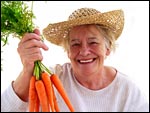We’re all fairly familiar with the environmental and economic benefits of farmers markets — they prevent food from traveling long distances, they keep money in the regional economy, they encourage organic farming, they keep land in the hands of local farmers and out of the hands of sprawly developers, etc. etc.
But as I strolled around the Ballard farmers market today, I was most struck by the social benefits.

It’s completely different from the typical retail experience in America. You’re forced to think about what’s in season, how to cook something tasty from the limited palette nature offers at a particular time. People mill about in the open air, in close proximity. Chatting and socializing occupy at least as much time as "shopping." Much of that socializing is with and among the people selling; the gulf between vendors and buyers shrinks. Sellers are personally connected to and invested in their products — eager to explain the benefits, offer samples, and talk about the history of their wares.
A vendor selling meats came out from behind his booth and approached us to explain that the fat in grass-fed beef is omega-3, "which is good for developing brains!" he said, pointing to our kids. We asked him if it could prevent brain shrinkage in adults … pointing to our kids. He laughed and said, "we can’t promise miracles."
This all happened, mind you, after we’d already bought and paid for the beef.
He wasn’t trying to sell us anything. He was proud of what he’d sold us.
Is anyone — the workers in China who made it, the sullen teenage cashier who sold it, the corporate executives who profit from it — proud of that cheap plastic geegaw you bought at Wal-Mart last week?
I’ve said it before, but it’s worth repeating: Americans aren’t materialists, not really. Yes, they "consume" lots of "products," but they do not appreciate material itself: the social and physical history of objects, the tactile, visceral reality of matter. To the American shopper, material is just a promise: of status, of convenience, of happiness. In itself it is a temporary totem, ephemeral and replaceable; indeed, the logic of the American economy depends on it being replaced, on it never being good enough.
No one is a "consumer" at a farmers market. Everyone, buyer and seller alike, is a human being. Every product is an expression of labor and love. Every transaction is a social bond formed.
Most Americans have simply never experienced anything like it. If more of them did, the environmentalist’s job might be easier.

